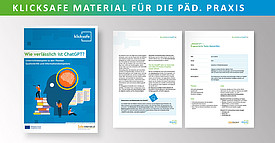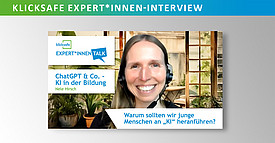School start 2023Start the new school year media literate!

Through the year with klicksafe
"Through the Year with klicksafe - 12 Units of Media Education for Elementary School" offers a guide that teachers* can already integrate into their school year planning. The units, as well as four additional projects, make it possible to design age-appropriate media education lessons for grades 2 to 6. To enable you to plan your lessons efficiently, all units are clearly structured and can be implemented quickly. The concept was developed in cooperation with the klicksafe Children's Panel, a focus group of students aged 7 to 11.
Our rules for the class chat
Especially at the beginning of the school year, so-called class chats are created. From a data protection perspective, they are problematic, especially when insecure services are used. Or messengers that are not yet permitted for children. It is important to define common rules for use in the class as early as possible. A lack of netiquette and time or topic limits in class chat groups often lead to cyberbullying or stress and have a negative impact on the class climate. klicksafe offers a teaching unit that teachers can use to support their students in dealing with class chats. The class can use the klicksafe poster to record the rules they have worked out together and then hang them up in the classroom.
Artificial intelligence in the classroom
In the klicksafe material "How reliable is ChatGPT?", educational professionals get an overview of ChatGPT and the challenges that can come with using the chatbot. Get ideas in five teaching examples on how to use AI-based chatbots in the classroom and discuss them with children and young people.
In the klicksafe Expert*innen-Talk on the topic of "ChatGPT & Co. - AI in education" , educator and educational scientist Nele Hirsch explains why children and young people should be introduced to the topic of AI at an early stage and how the risks of AI-based tools can be countered pedagogically.
Strengthen well-being through Digital Detox
The smartphone generation is feeling increasingly burned out. With the Digital Detox Box, young people learn to evaluate their own usage behavior, use digital devices more consciously, and think about digital well-being. The methods are designed for use in school lessons as well as for extracurricular youth work. They are well suited for spontaneous use in substitute lessons.
To go with the "Digital Wellbeing" method card from the Digital Detox Box, we also offer a poster to fill out yourself. With "Our tips for digital wellbeing" you can collect strategies together with the students to cope with digital stress.
The Digital Detox Challenge #AUSzeitspans a total of seven weeks. Each week, a different aspect of the Digital Detox is highlighted with the help of small exercises. Participants can learn more about themselves and their own media use. The aim of the exercises is not to generally give up digital media such as smartphones and the like. With the help of the Challenge, participants can consciously (more) deal with their own media use in order to check their inner balance and strengthen their digital well-being.
Fit in social media - flyers and quizzes for young people
TikTok, Snapchat and Instagram are among the most popular services for young people in Germany. To navigate safely on these platforms, you need some background knowledge. Which settings are important? What do I do if someone harasses me? Can I report illegal content? With our flyers and quizzes, young people can check how well they know about TikTok, Snapchat and Instagram.
Further materials for educational practice
The materials presented above are only a small selection. In our topic areas "Media Education in Elementary School" and "Media Education in Secondary School" you will find many more materials that will help you teach the safe use of media in the classroom. Or browse our overview of materials. If you are specifically looking for publications for the classroom, please set the filter in the "Target group" tab of the material overview to "Educators".














